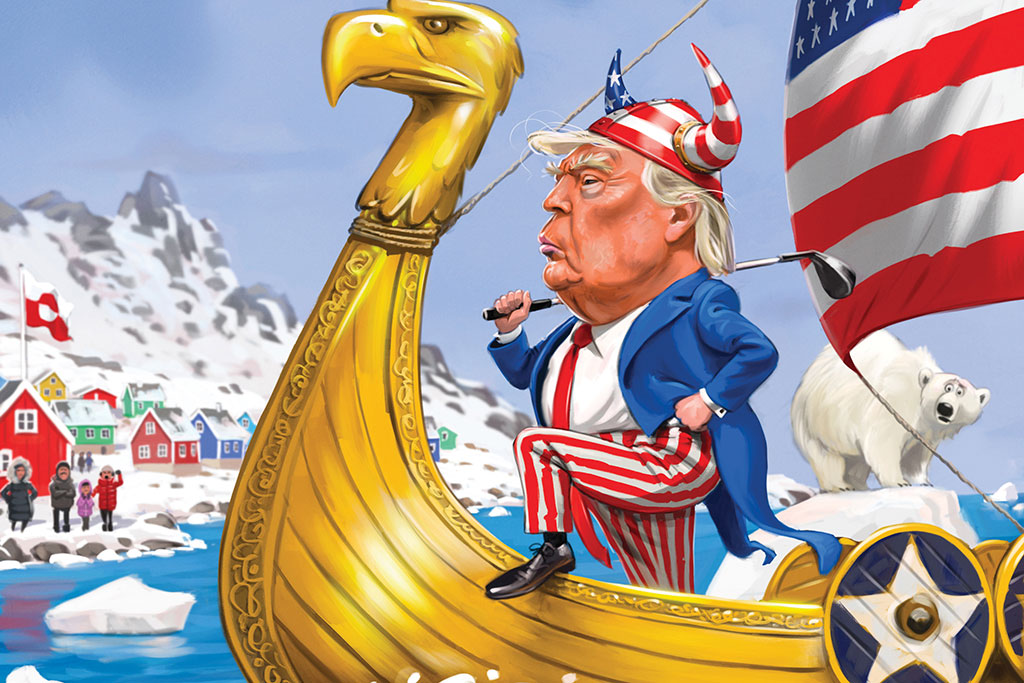What investors can expect from stocks and the economy in 2025
There are reasons for investors to be hopeful about 2025, with slowing interest rates and moderating oil prices. But trouble may be brewing in bond markets

Get the latest financial news, insights and expert analysis from our award-winning MoneyWeek team, to help you understand what really matters when it comes to your finances.
You are now subscribed
Your newsletter sign-up was successful
Want to add more newsletters?

Twice daily
MoneyWeek
Get the latest financial news, insights and expert analysis from our award-winning MoneyWeek team, to help you understand what really matters when it comes to your finances.

Four times a week
Look After My Bills
Sign up to our free money-saving newsletter, filled with the latest news and expert advice to help you find the best tips and deals for managing your bills. Start saving today!
This will be “a year of living dangerously”, says Katie Martin in the Financial Times. After two successive years of 20%-plus gains, the Wall Street boom could be living on “borrowed time”. Incoming US president Donald Trump might deliver US tax cuts, deregulation and a Ukraine peace deal, allowing stocks to “party like it’s 1996”, says Henry Neville of the Man hedge fund. Alternatively, his tariff policies could cause an inflationary surge that unleashes a 2022-style stock and bond rout. “Fireworks lie ahead in either case.”
How returning inflation echoes a 1970s economy
An inflationary comeback is an “underappreciated risk for 2025”, says Tom Stevenson in The Telegraph. There are “echoes of the late 1960s and early 1970s”, with central bankers crying victory over price rises before the job is done.
What else lies ahead? The “dominance of US tech giants” looks likely to end, if for no other reason than that Trump’s “America first” programme should help smaller US companies instead. Finally, it’s unreasonable to hope for another year of double-digit stock gains. Such a “melt-up” would see us enter “full bubble mode”, with things certain to “end badly”.
MoneyWeek
Subscribe to MoneyWeek today and get your first six magazine issues absolutely FREE

Sign up to Money Morning
Don't miss the latest investment and personal finances news, market analysis, plus money-saving tips with our free twice-daily newsletter
Don't miss the latest investment and personal finances news, market analysis, plus money-saving tips with our free twice-daily newsletter
The real trouble may be coming in bond markets, where government overspending could cause an investor revolt, says The Economist. The US government’s ten-year borrowing costs have already spiked from 3.6% in September to 4.6% today. A “big fear” is that Trump’s immigration and tariff plans will fuel inflation, forcing the Federal Reserve to keep interest rates elevated.
Are there reasons for optimism in 2025?
Warnings of a “spiral into a global trade war” in 2025 are “overdone”, argues Neil Shearing of Capital Economics. There is little global appetite for a tit-for-tat protectionist battle with America, while floating exchange rates will help absorb some of the tariff strain.
While a “low probability/high impact” event such as a conflict over Taiwan can never be ruled out, 2024 was a reminder that geopolitical risks can also be exaggerated. The last 12 months brought a major Middle East conflict and “the closure of one of the world’s most important shipping routes”. Yet oil prices fell and trade continued to roll. For all the challenges that the world economy faces, 2025 might prove to be “a year of muddling through”.
There are reasons to be hopeful about 2025, agrees Mehreen Khan in The Times. For one thing, interest rates are now “steadily falling” worldwide, providing a supportive backdrop for asset prices. Lower borrowing costs should take the edge off concerns about large public debt piles. Moderating oil prices are another tailwind.
Even the long-suffering FTSE isn’t looking so bad, say Khan and Tom Howard in the same paper. British blue chips rallied 5.8% in 2024, their fourth consecutive annual rise and the best run since the 2000s. It would have been even better were it not for a sterling rally that ate into the value of the FTSE’s predominantly international earnings – the pound was “the second-best performing major currency in the world after the US dollar” in 2024.
This article was first published in MoneyWeek's magazine. Enjoy exclusive early access to news, opinion and analysis from our team of financial experts with a MoneyWeek subscription.
Get the latest financial news, insights and expert analysis from our award-winning MoneyWeek team, to help you understand what really matters when it comes to your finances.
Alex is an investment writer who has been contributing to MoneyWeek since 2015. He has been the magazine’s markets editor since 2019.
Alex has a passion for demystifying the often arcane world of finance for a general readership. While financial media tends to focus compulsively on the latest trend, the best opportunities can lie forgotten elsewhere.
He is especially interested in European equities – where his fluent French helps him to cover the continent’s largest bourse – and emerging markets, where his experience living in Beijing, and conversational Chinese, prove useful.
Hailing from Leeds, he studied Philosophy, Politics and Economics at the University of Oxford. He also holds a Master of Public Health from the University of Manchester.
-
 Early signs of the AI apocalypse?
Early signs of the AI apocalypse?Uncertainty is rife as investors question what the impact of AI will be.
-
 Reach for the stars to boost Britain's space industry
Reach for the stars to boost Britain's space industryopinion We can’t afford to neglect Britain's space industry. Unfortunately, the government is taking completely the wrong approach, says Matthew Lynn
-
 Profit from MSCI – the backbone of finance
Profit from MSCI – the backbone of financeAs an index provider, MSCI is a key part of the global financial system. Its shares look cheap
-
 'AI is the real deal – it will change our world in more ways than we can imagine'
'AI is the real deal – it will change our world in more ways than we can imagine'Interview Rob Arnott of Research Affiliates talks to Andrew Van Sickle about the AI bubble, the impact of tariffs on inflation and the outlook for gold and China
-
 How Canada's Mark Carney is taking on Donald Trump
How Canada's Mark Carney is taking on Donald TrumpCanada has been in Donald Trump’s crosshairs ever since he took power and, under PM Mark Carney, is seeking strategies to cope and thrive. How’s he doing?
-
 Three promising emerging-market stocks to diversify your portfolio
Three promising emerging-market stocks to diversify your portfolioOpinion Omar Negyal, portfolio manager, JPMorgan Global Emerging Markets Income Trust, highlights three emerging-market stocks where he’d put his money
-
 Exciting opportunities in biotech
Exciting opportunities in biotechBiotech firms should profit from the ‘patent cliff’, which will force big pharmaceutical companies to innovate or make acquisitions
-
 What turns a stock market crash into a financial crisis?
What turns a stock market crash into a financial crisis?Opinion Professor Linda Yueh's popular book on major stock market crashes misses key lessons, says Max King
-
 Why does Trump want Greenland?
Why does Trump want Greenland?The US wants to annex Greenland as it increasingly sees the world in terms of 19th-century Great Power politics and wants to secure crucial national interests
-
 'Investors should brace for Trump’s great inflation'
'Investors should brace for Trump’s great inflation'Opinion Donald Trump's actions against Federal Reserve chair Jerome Powell will likely stoke rising prices. Investors should prepare for the worst, says Matthew Lynn